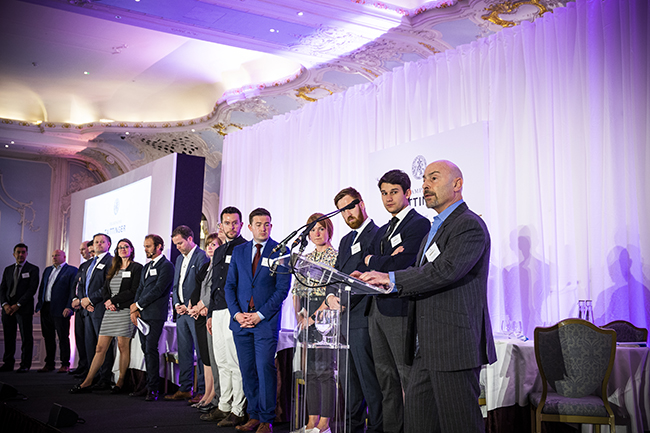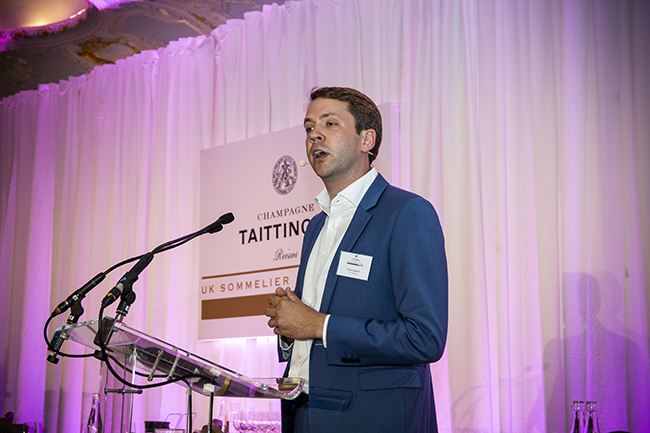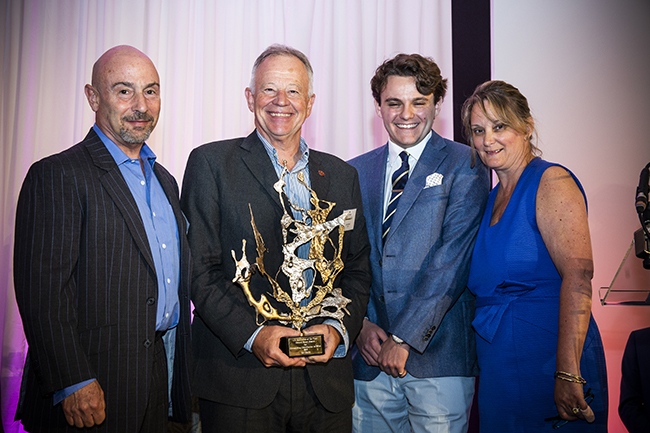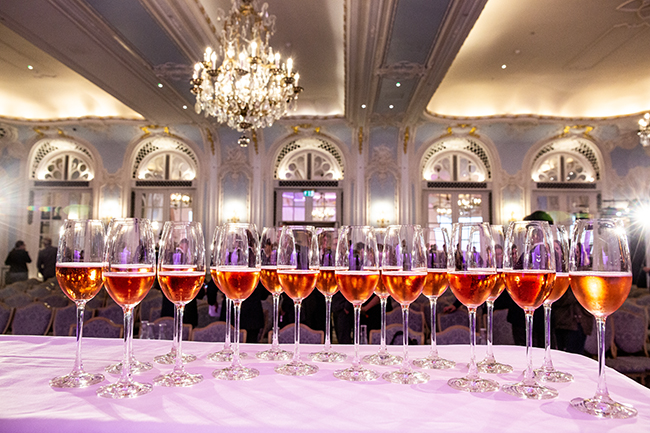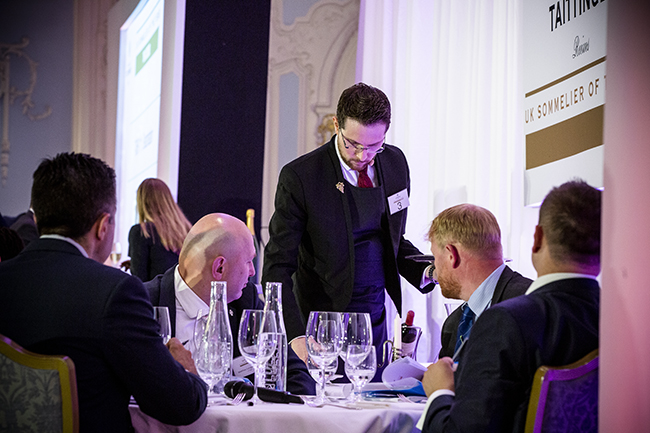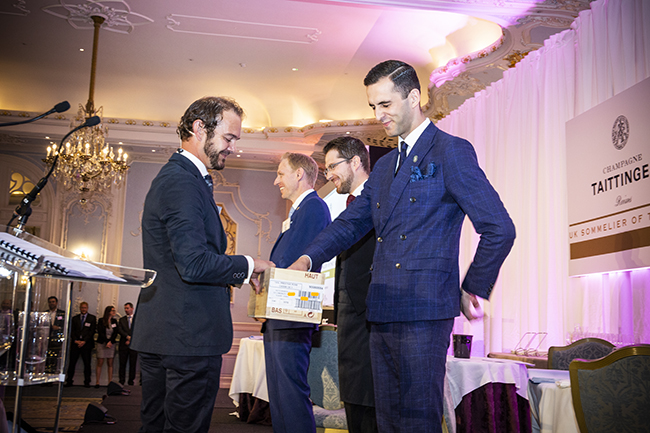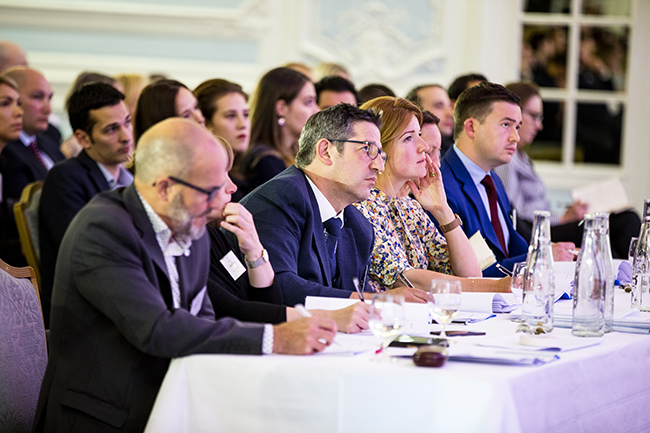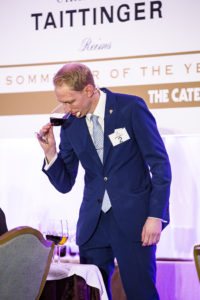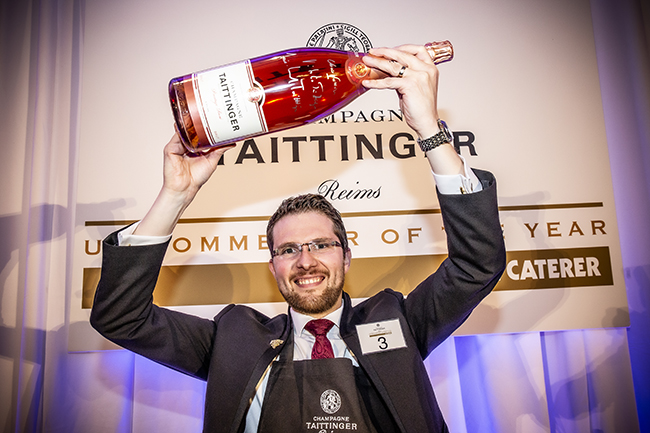Some 15 front of house stars made the finals day of UK Sommelier of the Year 2019, but only one could triumph: Romain Bourger of the Vineyard. Fiona Sims reports
Gareth Ferreira is wringing his hands. "I didn't use the measure," he says, looking rather despondent as he waits to hear the results that will decide if he has made it through to the final.
The Core by Clare Smyth sommelier had already made it into the final six of the Champagne Taittinger UK Sommelier of the Year competition, held at the Savoy hotel, but during the table service task he had measured out glasses of wine solely using his naked eye. "There's a reason why the measure is there," warns judge and former winner Christopher Delalonde, afterwards.
It's Ferreira's third time in the semis and he's keen to reach the final, something he achieved in 2017 when he came second. "It's addictive, you know. When you start seeing yourself doing better and better, you realise you could actually win this," he says. "But even if I don't win, it's just nice to be part of it," he adds, echoing the sentiments of all the sommeliers I talk to that day.
Ferreira needn't have worried about his faux pas with the measuring cup, which, Delalonde revealed after the event, hardly any of the sommeliers used anyway, as it's announced that Ferreira has indeed reached the final. The contestants have been whittled down from 15 (all male) quarter-finalists who started the day to three. Ferreira is joined by Romain Bourger of the Vineyard in Stockcross and Alan Bednarski of Texture in London.
This competition, now in its 40th year, is tough by any standards. But trying to stay calm while more than 200 trade dignitaries are gazing on in the Savoy's gilt-edged River Room is something else. And that's not to mention the calibre of the judges, among them the best sommeliers in the country, led by head judges including Kathrine Larsen, Eric Zwiebel and Laura Rhys. Before the final kicks off, 16 former winners of the competition troop out onto the stage, many of whom will act as judges for this next gruelling instalment.
It acted as the cue for Basset's wife Nina and son Romané to step onto the stage and announce the launch of a new prize, the Gerard Basset Award for outstanding contribution to the wine industry. This year it went to Ian Harris, chief executive of the Wine & Spirit Education Trust.
Soon it's time for the first of the tasks – correcting errors on a wine list followed by a blind tasting of wines and spirits, a bar service scenario (new for this year), food and wine pairing role-play, a decantation exercise, a wine industry knowledge quiz and ending with the iconic magnum Champagne pour.
This all comes after a gruelling round of competition stages, which saw some 60 candidates invited to one of the regional finals held in London, Bristol and Manchester. The 15 highest scorers were taken through to the quarter-finals, split over two days, the second part held earlier that day. First, a blind tasting and written paper tested their knowledge, followed by the so-called 'snappy scenario'. The six highest- placed candidates made it through to the semi-finals, where they completed three further tasks – an oral commercial blind tasting, a service task and corrections of a wine list.
The other semi-finalists were Pierre Brunelli from L'Enclume in Cumbria; Paul Robineau from Moor Hall in Lancashire; and Tamas Czinki from Northcote, also in Lancashire.
So back to the final three and the first task: another round of correcting errors on a wine list. Each of the eight slides shown has three wines per slide, with at least one mistake on each slide. Each is shown for 30 seconds – with the audience and judges all looking on.
Some of the audience can't help audibly (though not decipherably) whispering their suggestions. But would you know, for example, that Germany's Weingut DÁ¶nnhoff is in the Nahe, not Ahr? And that Ferrari Perlé Blanc is not in Franciacorta, but Trento DOC? The finalists didn't either.
Nor did they recognise a picture of Spain's most famous wine producer, Miguel Torres, although they did all spot that the architectural cube in the picture of a vineyard belonged to d'Arenberg in McLaren Vale, Australia.
There's a moment of levity that breaks the tension after Ferreira chooses a Kent fizz from Gusbourne Estate to partner the tomato tartare starter – he was asked to suggest five wines from outside the EU to pair each course in a menu revealed to him at that moment. "Well, Kent probably will be outside the EU very soon," he jests.
Finalist Bourger, a six-time competitor, runs with the judges' suggestion that they think outside the box when he suggests a pairing of PatrÁ³n Blanco tequila with the turbot dish. "It'll work well with the saltiness of the accompanying caviar," he explains to the judges.
The new task for this year, the bar service, elicits enthusiastic responses from all three competitors as they approach the 'bar' and are encouraged to engage with the 'customers', instructed by judge Nicolas Clerc. Each of the three customers orders something different: a Champagne-based cocktail, a sherry and a sweeter style of Champagne.
Bednarski explains the concept of the classic Champagne cocktail as he waits for a sugar cube to dissolve in a glass of bitters and Cognac before pouring over Taittinger Brut, highlighting the importance of the addition of orange zest as the garnish. Then he moves on to the subject of the rising popularity of sherry, explaining his choice of Palo Cortado, while Taittinger's higher dosage Nocturne is poured for the last judge. He finishes with a minute or two to spare, so deftly makes up the time by going off-script with suggestions for accompanying canapés.
"I think the blind tastings are the hardest bit," says Rousset after, and the finalists' answers certainly do vary wildly. In the first part, they have to identify the region, grape variety, appellation and vintage of each of the three wines in front of them. Then they have to place each wine in age order. In the final part, they must identify four beverages in black glasses, and suggest a classic cocktail. Bourger manages to raise a laugh when he answers the latter. "I suggest a margarita, as it brings back some happy memories for me."
After three hours on stage, it's time for the money shot – the magnum Champagne pour, the iconic finale to the country's toughest sommelier competition. As the finalists spend the next six minutes carefully filling 19 glasses as instructed (a googly thrown by the judges as there are 20 glasses on the table – who would not listen to the task properly and fill all of them, thereby losing marks?), the audience look on.
Step forward Romain Bourger, this year's UK Sommelier of the Year, with Gareth Ferreira in second place and Alan Bednarski, a first-timer in the final, coming in third. Says Taittinger's McKee, presenting the award: "There has to be a winner and Bourger held his cool under pressure to take the title."
The semi-finalists
Alan Bednarski, head sommelier, Texture, London
Romain Bourger, head sommelier, the Vineyard in Stockcross, Berkshire
Pierre Brunelli, operations manager, L'Enclume, Cartmel, Cumbria
Tamas Czinki, head sommelier, Northcote, Langho, Lancashire
Gareth Ferreira, head sommelier, Core by Clare Smyth, London
Paul Robineau, sommelier, Moor Hall, Aughton, Lancashire
Keeping it in the family
"Big love to everyone from Pierre Emmanuel," begins Kevin McKee, Taittinger's UK director, at the opening this year's Champagne Taittinger UK Sommelier of the Year competition.
Taittinger is big on family. It's one of the few Champagne houses to be owned and actively managed by the eponymous family, and they've been sharing the love since it was founded in 1931.
The desire to pass on know-how, history and passion has always been at the heart of Taittinger. Pierre Emmanuel, together with son Clovis and daughter Vitalie, continues to share the magic of Champagne, but also show great enthusiasm for supporting the new generation of hospitality professionals.
Taittinger is the story of a demanding and passionate family who has never chosen to compromise on quality. It champions front-of-house wine service with the UK Sommelier of the Year and also recognises top talent through Le Prix Culinaire International. The latter is the oldest culinary competition of its kind and was launched by Pierre Emmanuel's uncle, Claude Taittinger. Both are technical, challenging contests and celebrate young people at the top of their game.
And all that passion starts with Taittinger Champagne. With its finesse and elegance, it's recognisable throughout the world, the secret lying in the large proportion of Chardonnay used to make the individual cuvées. The Champagne is present in 150 countries, and Taittinger will tell you that it owes its success to a bold balance of tradition, the personal touch, a thirst for creativity and always aspiring to make the best Champagne it can. In short, Taittinger makes a very suitable partner to the UK Sommelier of the Year competition.
What the finalists said
Gareth Ferreira
"It's always interesting to see how each year the judges manage to surprise the finalists with something new. The hardest thing is the unknown and having to think on your feet against the clock under a huge amount of pressure. Ultimately, the winner will be the one who manages the stress and is consistent in all the tasks.
"The most challenging task? It's hard to say, as we do a lot of it every day in our own restaurants. The blind tasting can be tricky, as a part of you wants to go with your gut feeling, but then the pressure takes over and you think you have to take a risk, which if it works, is great, but if it doesn't, it can mean the end of your challenge."
Alan Bednarski
"This was the first time in the final for me. The biggest challenge? Staying focused. It's hard to concentrate up there on stage, especially when it comes to understanding the tasks. You have to try and forget the crowd is out there watching you. In fact, I completely lost it at one point, so I lost the task. That said, I enjoyed it all. The scenarios we have to act out are pretty much what we do on an everyday basis in the restaurant. I just have to remember to go with it next time. And there will be a next time – I'll come back even stronger next year."
Romain Bourger
"The hardest bit for me was being the third to go. It felt like forever waiting for my turn. The pressure really builds. I might have seemed calm up there on stage, but I was so stressed out. In fact, just before I went on, I took a few seconds to breathe slowly, which calmed me a little. My favourite task was the bar service – that was interesting. I do a little bit at the bar in the restaurant anyway as it's as important as the wine service and an increasing number of people now know much more about other beverages."
What the judges said about the winner
Nicolas Clerc "This wasn't Romain's first time in the final so he knows the competition, which helps. To be honest, we expected him to reach the final. Romain was consistent throughout, and consistency is the key to winning this – and perseverance, of course. Timing is important, too – but perhaps the tasks were sometimes a bit too easy for him as he finished early. He was calm too, that's another key to winning this. I'd love to know his secret."
Gearoid Devaney "I think it is important to say that all the finalists did an amazing performance and they should all be proud of what they have achieved. Romain was the most calm on the stage and a deserved winner – he always seemed in control of the situation and was consistent in all the tasks across the afternoon. I am sure this is what helped get him over the winning line."
Roger Jones "Romain was cool and collected; his presence was mature and steadfast. Standing on stage in front of more than 200 esteemed trade guests for over 30 minutes is an immense feat in itself, but then to have to complete five tasks in quick succession certainly highlights his true abilities. Romain is a true UK Sommelier of the Year and joins a band of the very best sommeliers in the UK."
Jan Konetski "We had the cream of UK sommeliers competing, and it is an amazing achievement to be part of the semi-final. You need to know your stuff but you also need a chunk of luck to face tasks that suit your skills. Some are better than others in tasting, theory or customer service. All these skills are tested but not always in the same way.
"Romain has been competing for five years and he finally came through. Right from the morning session he did a top job. Romain seemed to be in a confident place, a result of his experience and knowledge. He took on every task, understood it, and then nailed it. Listening to and understanding the tasks gives you the foundation to smash it. If you miss a detail of a task or take a wrong turn, it can cost you the top spot."
Laura Rhys "Romain did very well indeed. His performance on the stage was a superb balance of skill, knowledge and an excellent tableside manner. A real pleasure to watch. Bravo, Romain!"
Xavier Rousset "Romain was the most consistent on the day. He handles his nerves well. It obviously helped that he had done the competition many times before so he knew what to expect. He was pretty strong in every task."
Continue reading
You need to be a premium member to view this. Subscribe from just 99p per week.
Already subscribed? Log In

